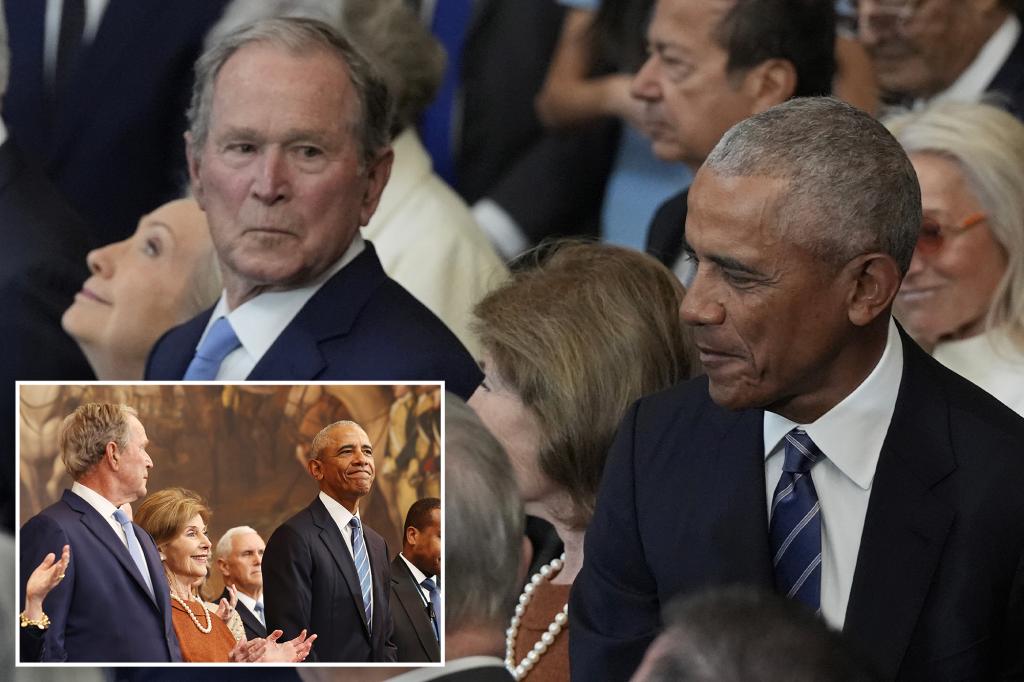The inauguration of Donald Trump as the 45th President of the United States was a momentous occasion, marked not only by the formal transfer of power but also by a subtle yet intriguing exchange between two former presidents, Barack Obama and George W. Bush. Amidst the pomp and circumstance, a brief, seemingly lighthearted interaction between the two men captured the attention of onlookers and ignited speculation about the nature of their conversation. A viral video featuring the moment fueled further intrigue, prompting a deaf lip-reader, Jackie Gonzalez, to offer her interpretation of their exchange.
Gonzalez, known for her social media presence where she analyzes the unspoken communications of public figures, posited that Obama, after exchanging pleasantries with Bush, expressed a sentiment of concern, purportedly asking, “How can we stop what’s happening?” This alleged remark, coupled with Bush’s seemingly amused reaction, sparked widespread online discussion. While the exact context of Obama’s words remained ambiguous, many interpreted them as a veiled expression of apprehension regarding the incoming Trump administration. This interpretation resonated with a significant portion of the online community, particularly those who held reservations about Trump’s presidency.
However, it’s crucial to acknowledge the inherent limitations of lip reading. Gonzalez herself includes a disclaimer on her platforms, emphasizing that lip reading is not a foolproof method of communication and that her interpretations are merely alleged, not definitive. The ambiguity of facial expressions and the absence of audible sound make it challenging to ascertain the precise meaning behind such nonverbal exchanges. Therefore, while Gonzalez’s interpretation provided an intriguing narrative, it remained speculative, leaving room for alternative explanations. The possibility that Obama’s remark pertained to something entirely different, such as the enthusiastic applause of the crowd, could not be discounted.
The viral nature of the video and Gonzalez’s interpretation underscored the public’s fascination with the unspoken language of political figures. In an era of heightened political polarization, even the slightest gestures and expressions of prominent individuals are scrutinized and interpreted, often through the lens of pre-existing biases. The incident highlighted the power of social media in amplifying such interpretations and shaping public perception, even in the absence of concrete evidence. The online community’s reaction, ranging from amusement to serious political commentary, reflected the diverse range of perspectives on the interaction.
The incident also served as a subtle reminder of the complex relationships between past and present administrations. While transitions of power are typically marked by a sense of decorum and respect, underlying tensions and differing political philosophies often persist. The seemingly casual exchange between Obama and Bush, regardless of its exact meaning, offered a glimpse into the intricate dynamics between former presidents navigating the changing political landscape. Their shared experience of holding the highest office in the land, despite their political differences, created a unique bond, evident in their seemingly comfortable interaction.
In conclusion, the brief interaction between Obama and Bush at Trump’s inauguration generated significant online buzz, fueled by a viral video and a lip-reader’s interpretation. While the precise meaning of their exchange remained open to interpretation, the incident highlighted the public’s fascination with the unspoken language of politics and the power of social media in shaping narratives. The ambiguous nature of the interaction, coupled with the inherent limitations of lip reading, underscored the importance of cautious interpretation and the need to acknowledge the speculative nature of such analyses. Ultimately, the incident served as a reminder of the complex relationships between past and present administrations and the enduring public interest in the subtle dynamics of political figures.

